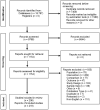Nutrition as prevention for improved cancer health outcomes: a systematic literature review
- PMID: 37212631
- PMCID: PMC10290234
- DOI: 10.1093/jncics/pkad035
Nutrition as prevention for improved cancer health outcomes: a systematic literature review
Abstract
Background: Among adults with cancer, malnutrition is associated with decreased treatment completion, more treatment harms and use of health care, and worse short-term survival. To inform the National Institutes of Health Pathways to Prevention workshop, "Nutrition as Prevention for Improved Cancer Health Outcomes," this systematic review examined the evidence for the effectiveness of providing nutrition interventions before or during cancer therapy to improve outcomes of cancer treatment.
Methods: We identified randomized controlled trials enrolling at least 50 participants published from 2000 through July 2022. We provide a detailed evidence map for included studies and grouped studies by broad intervention and cancer types. We conducted risk of bias (RoB) and qualitative descriptions of outcomes for intervention and cancer types with a larger volume of literature.
Results: From 9798 unique references, 206 randomized controlled trials from 219 publications met the inclusion criteria. Studies primarily focused on nonvitamin or mineral dietary supplements, nutrition support, and route or timing of inpatient nutrition interventions for gastrointestinal or head and neck cancers. Most studies evaluated changes in body weight or composition, adverse events from cancer treatment, length of hospital stay, or quality of life. Few studies were conducted within the United States. Among intervention and cancer types with a high volume of literature (n = 114), 49% (n = 56) were assessed as high RoB. Higher-quality studies (low or medium RoB) reported mixed results on the effect of nutrition interventions across cancer and treatment-related outcomes.
Conclusions: Methodological limitations of nutrition intervention studies surrounding cancer treatment impair translation of findings into clinical practice or guidelines.
© The Author(s) 2023. Published by Oxford University Press.
Conflict of interest statement
HMP, MF, HIA, SB, AC, TW, MK, EE, AL, AS, SS, JS, CS, WN, and MB have no disclosures to report.
Figures


References
-
- Aaldriks AA, Maartense E, Nortier HJ, et al.Prognostic factors for the feasibility of chemotherapy and the Geriatric Prognostic Index (GPI) as risk profile for mortality before chemotherapy in the elderly. Acta Oncol. 2016;55(1):15-23. - PubMed
-
- Aparicio T, Bouché O, Francois E, et al.; for PRODIGE 20 investigators. Geriatric analysis from PRODIGE 20 randomized phase II trial evaluating bevacizumab+chemotherapy versus chemotherapy alone in older patients with untreated metastatic colorectal cancer. Eur J Cancer. 2018;97:16-24. - PubMed
-
- Guner A, Kim SY, Yu JE, et al.Parameters for predicting surgical outcomes for gastric cancer patients: simple is better than complex. Ann Surg Oncol. 2018;25(11):3239-3247. - PubMed
-
- Van Cutsem E, Arends J.. The causes and consequences of cancer-associated malnutrition. Eur J Oncol Nurs. 2005;9(Suppl 2):S51-S63. - PubMed
Publication types
MeSH terms
Grants and funding
LinkOut - more resources
Full Text Sources
Medical
Miscellaneous
